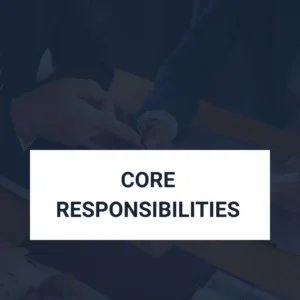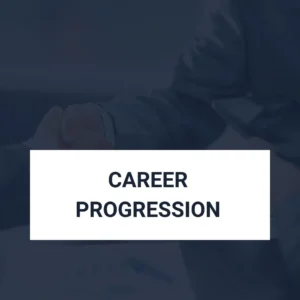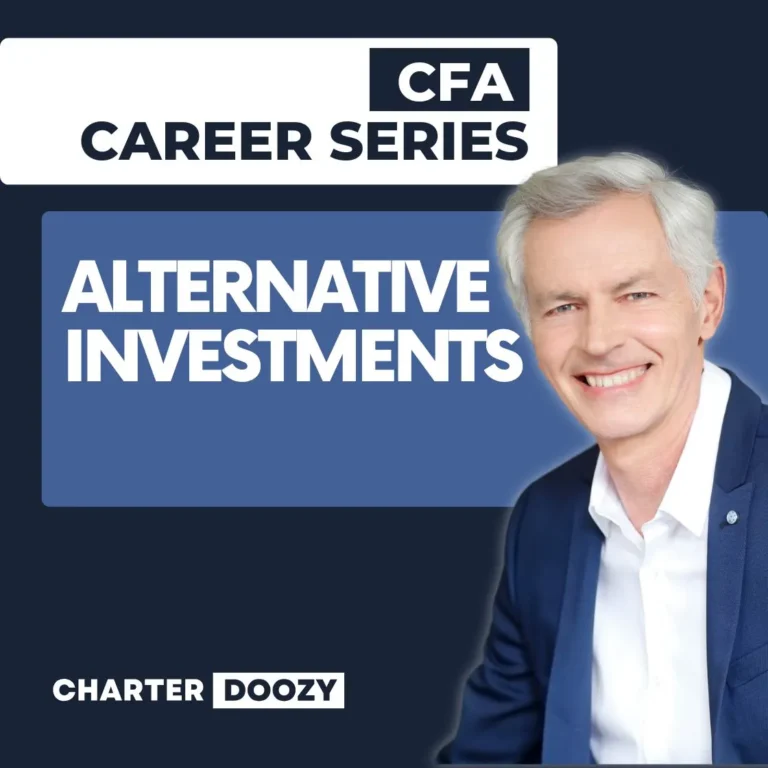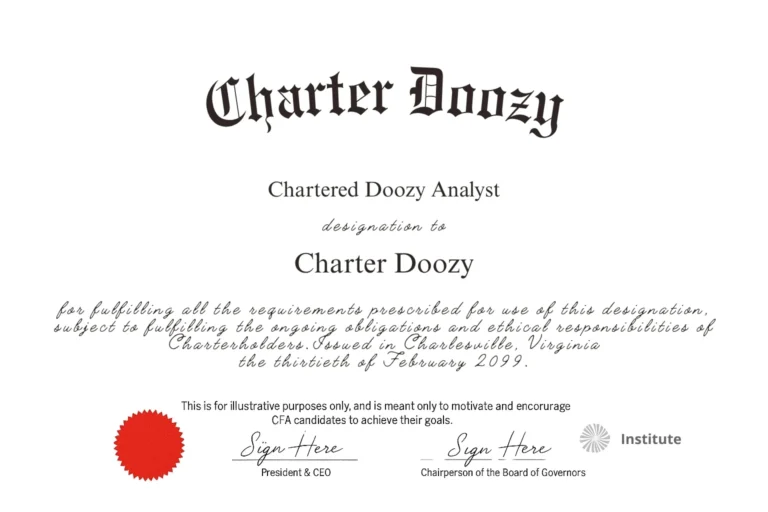Alternative investments are no longer on the fringe of finance.
Today, they’re at the center of how institutions, endowments, and high-net-worth individuals build diversified portfolios and generate alpha.
From private equity to real estate, hedge funds to infrastructure, alternatives offer exposure to assets beyond the traditional stock-and-bond mix.
For CFA candidates, this space is increasingly attractive.
It combines deep financial analysis with strategic thinking, long-term value creation, and hands-on exposure to real assets and private businesses.
While it may not be as visible or accessible as public markets, alternative investments offer some of the most intellectually rewarding and financially compelling roles in the investment world.
In this article, we’ll unpack what alternative investments really are, why they matter, and how CFA candidates can break into the space.
Whether you’re curious about private equity, venture capital, or real assets, this guide will help you understand the opportunities – and decide if this is the right path for you.

What Are Alternative Investments?
Alternative investments refer to asset classes that fall outside the traditional categories of publicly traded stocks, bonds, and cash.
These assets are often less liquid, more complex, and structured differently.
But they offer unique return profiles and powerful diversification benefits.
Categories of Alternative Investments
Private Equity (PE)
Invests directly in private companies through buyouts, growth capital, or restructuring.
PE firms take active roles in shaping company strategy and aim to exit via sale or IPO.
Venture Capital (VC)
Focuses on early-stage, high-growth startups.
VC investors provide funding and strategic guidance in exchange for equity, with the goal of outsized returns upon exit.
Hedge Funds
Pooled investment vehicles that use advanced strategies like long-short equity, global macro, arbitrage, and derivatives.
They target absolute returns, often with higher risk and lower liquidity.
Private Credit
Non-bank lending to companies, including direct lending, mezzanine debt, distressed debt, and special situations.
Grows in importance as companies seek alternatives to traditional financing.
Real Estate
Includes direct ownership of income-generating properties, REITs, and real estate private equity.
Investors gain exposure to rent income, appreciation, and inflation protection.
Infrastructure
Involves long-lived physical assets like toll roads, airports, power plants, and data centers.
Attractive for their stability and long-term income streams.
Commodities and Natural Resources
Covers oil, gas, agriculture, metals, and timberland.
Offers diversification and inflation hedging but can be volatile.
Niche Alternatives
Art, collectibles, wine, music royalties, litigation finance, and crypto.
These are highly specialized, less regulated, and often driven by unique market dynamics.
What Sets Alts Apart?
Illiquidity – Most alternatives involve long lock-up periods, meaning investors commit capital for years.
Complexity – Valuation methods are less straightforward, and due diligence is critical.
Information Asymmetry – Data is less standardized and less widely available.
Manager Skill – Returns often rely heavily on manager expertise and deal selection.
Non-Correlation – Alternatives often move independently of public markets, providing valuable diversification.
For investors seeking return enhancement, downside protection, or long-term capital appreciation, alternatives are becoming an essential portfolio component.
Doozy Digest
A newsletter for CFA candidates
Subscribe for:
✔ Insightful tips
✔ Expert advice
✔ Career motivation
✔ Exam inspiration
Stay updated and subscribe today!

Core Responsibilities of CFA Investment Professionals in the Alternative Investment Industry
Working in alternative investments requires a blend of technical skill, strategic thinking, and deep industry knowledge.
Whether you’re sourcing deals, conducting due diligence, or managing portfolio companies, your role will vary depending on the type of alternative asset and the structure of the firm.
Deal Sourcing and Origination
Professionals in private equity, venture capital, and private credit often spend significant time identifying and evaluating new investment opportunities.
This includes:
Building networks with founders, bankers, and advisors
Screening companies for strategic fit
Conducting preliminary analysis to assess viability
Leading early-stage calls and relationship-building efforts
Being proactive, resourceful, and commercially minded is key at this stage.
Due Diligence
Once a potential investment is identified, CFA professionals take the lead in performing in-depth due diligence.
This can include:
Financial statement analysis and model building
Industry and competitor benchmarking
Customer and supplier interviews
Legal and operational reviews
Assessing ESG factors and exit scenarios
Strong analytical and investigative skills are crucial here, as decisions often involve large amounts of capital and high stakes.
Valuation and Structuring
Valuation in private markets is more art than science.
Professionals must navigate incomplete data, uncertain assumptions, and illiquid markets.
Responsibilities include:
Building discounted cash flow (DCF) or comparable company models
Applying multiples-based valuation techniques
Structuring deal terms (preferred shares, earn-outs, covenants, etc.)
Working with legal teams to finalize transaction documents
This is where CFA training in valuation, capital structure, and financial modeling really shines.
Portfolio Management
Once an asset is acquired, managing it is a long-term, active process.
Professionals may be involved in:
Monitoring performance against forecasts
Supporting operational improvements or strategic pivots
Attending board meetings or advising management
Managing follow-on investments or restructurings
In real estate and infrastructure, this can include property development, leasing, or asset disposal decisions.
Risk Management and Reporting
Given the complexity and illiquidity of alternatives, risk oversight is critical.
Responsibilities often include:
Tracking key risk indicators across portfolio assets
Stress testing and scenario analysis
Preparing investor updates and fund performance reports
Ensuring compliance with investment mandates
Firms expect investment professionals to think critically about downside risks… not just upside potential.
Fundraising and Investor Relations
At senior levels, professionals play a role in securing capital and maintaining relationships with limited partners (LPs).
This involves:
Crafting investment theses and track records
Presenting at investor meetings and roadshows
Responding to due diligence questionnaires (DDQs)
Managing reporting and transparency expectations
Strong communication and storytelling skills are vital.
Especially when dealing with institutional clients or high-net-worth investors.

Why CFA Candidates Are a Good Fit
Alternative investments may be complex and opaque.
But that’s exactly where the CFA Charterholder shines.
With a strong foundation in investment theory, ethics, valuation, and portfolio management, CFA candidates are well positioned to contribute meaningfully in the alt space.
More firms are actively seeking professionals who combine deep technical training with sound judgment and analytical discipline.
CFA Curriculum Alignment
The CFA Program provides a strong base for success in alternatives, especially at Levels II and III:
Equity and Fixed Income Valuation – critical for deal structuring, assessing private company value, or analyzing real assets
Corporate Finance – relevant for capital structure analysis, leveraged buyouts, and private credit deals
Alternative Investments (dedicated topic) – covers hedge funds, private equity, real estate, commodities, infrastructure, and more
Quantitative Methods – applied in fund performance analysis, scenario modeling, and benchmarking
Portfolio Management and Asset Allocation – essential when alternatives are viewed in the context of a broader institutional portfolio
Ethics and Professional Standards – especially valuable in less regulated and less transparent markets
The CFA curriculum’s growing emphasis on real assets, ESG integration, and illiquid strategies reflects the evolving role of alternatives in modern portfolios.
Skills CFA Candidates Bring to the Table
Analytical Rigor – You know how to assess companies, assets, and risks from the bottom up.
Financial Modeling Fluency – You can build and interpret DCFs, comps, and sensitivity analyses under uncertainty.
Global Mindset – You’re trained to think across geographies, sectors, and currencies.
Institutional Perspective – You understand how large investors build portfolios—and how alts fit in.
Ethical Foundation – In a world of private deals and asymmetric information, this is a core advantage.
Natural Fit for Long-Term Thinking
Alternative investments often operate on longer timelines than public markets.
That means fewer daily price movements – and more focus on strategy, execution, and exit planning.
CFA candidates, who are trained to analyze investments holistically and think in years, not quarters, are especially well suited to this mindset.
Whether you’re analyzing a growth-stage company, structuring a mezzanine loan, or modeling a real estate portfolio, your CFA toolkit gives you the language, the logic, and the lens to succeed.

Skills and Traits That Help You Succeed
Success in alternative investments requires more than technical ability.
The most effective professionals in this space combine sharp financial skills with strategic thinking, patience, and a strong sense of commercial judgment.
If you’re considering a career in alternatives, here’s what will help you thrive.
Key Technical Skills
Financial Modeling and Valuation
You’ll need to be fluent in building complex models—especially for companies or assets with limited data.
Discounted cash flow (DCF), precedent transactions, comparables, and scenario analysis are all critical.
Due Diligence
Assessing a potential investment means digging deep.
You’ll need to evaluate management teams, financials, operations, legal issues, and industry dynamics – often with incomplete information.
Deal Structuring
Understanding capital structure, term sheets, debt covenants, and equity preferences is essential – particularly in private equity, venture capital, and private credit.
Risk Assessment
Since many alternative investments are illiquid and opaque, you must be able to identify downside risks, analyze stress scenarios, and think carefully about tail events.
Reporting and Benchmarking
You’ll often prepare investor materials, fund updates, and internal performance reports.
Understanding how to attribute returns and compare across funds or strategies is key.
Core Personal Traits
Patience
Returns in alternatives take time.
Sometimes years.
You need to be comfortable making long-term bets, and staying committed through market cycles and business challenges.
Curiosity
Alts are often messy and non-standard.
The best professionals ask great questions, look beyond the obvious, and want to understand how businesses really work.
Commercial Awareness
Ultimately, you’re trying to create value… by backing the right companies, assets, or teams.
A good nose for strategy, business models, and financial outcomes is essential.
Communication
You’ll need to explain complex ideas to founders, investors, and partners.
Clarity, brevity, and confidence go a long way.
Especially during negotiations or presentations.
Adaptability
Markets shift.
Deals fall through.
Timelines stretch.
Working in alts means staying calm amid uncertainty and being ready to adjust as needed.
This is not a fast-paced trading desk or a rigid corporate ladder.
It’s a dynamic, complex world of high-stakes decisions and long-term plays.
If that excites you (and if your strengths align) alternative investments could be the perfect fit.

Typical Career Progression
The career path in alternative investments varies by firm and asset class, but generally follows a structured progression – especially in private equity, venture capital, and hedge funds.
Entry is competitive, but those who break in often enjoy faster exposure to meaningful work and rapid skill development.
Entry-Level Roles
Analyst / Investment Analyst
Most candidates start here, often after a few years in investment banking, consulting, or audit.
Responsibilities include:
Financial modeling
Industry research
Supporting due diligence
Preparing investment memos
Managing data rooms and deal pipeline tracking
In real estate or infrastructure, you may also be involved in asset-level modeling, project finance, or site-level evaluations.
Associate
Some firms hire directly into associate roles.
Especially those with prior transaction experience or an MBA.
Associates take on more ownership in deal analysis and may begin to lead portions of due diligence.
Mid-Level Roles
Senior Associate / VP
At this stage, professionals typically manage deal execution, lead financial modeling, oversee analysts, and play a key role in committee discussions.
You may:
Lead negotiations with counterparties
Develop investment theses
Begin mentoring junior talent
Present directly to investment committees or partners
Those on the fundraising or investor relations side may also take on LP communication responsibilities.
Senior Roles
Principal / Director
Now you’re sourcing deals, managing portfolio companies, and beginning to make decisions on capital deployment.
Principals often own relationships with bankers, advisors, and targets… and begin to specialize in sectors or deal types.
Partner / Managing Director
At the top of the ladder, you’re responsible for strategy, fund performance, team management, and investor relationships.
You may also sit on boards of portfolio companies and guide exit planning.
Other Progression Tracks
Operating Partner / Value Creation Team – Focused on improving portfolio company performance
Investor Relations / Fundraising – Building the capital base and maintaining LP relationships
Secondaries / Fund-of-Funds / Allocator Roles – Careers with LPs, family offices, or asset managers that invest in other funds
Career paths in alternatives aren’t always linear, but they reward performance, insight, and the ability to spot and shape great investments.

Where You’ll Work
Alternative investments span a wide range of firm types, each offering different experiences, client bases, and focus areas.
Whether you’re drawn to the fast-paced world of private equity deals or the long-term projects of infrastructure investing, the landscape offers plenty of options.
Private Equity Firms
These firms acquire companies, improve them operationally, and aim to sell them for a profit.
They vary in size and strategy:
Large-Cap PE (e.g., Blackstone, KKR, Carlyle) – Big deals, global scope, highly competitive
Middle-Market PE – Focused on smaller companies with growth potential
Growth Equity – Investing in expanding firms without taking full control
Venture Capital Firms
VC firms invest in startups and early-stage companies, often in technology or life sciences.
The work is fast-moving and entrepreneurial, with smaller teams and a higher appetite for risk.
Hedge Funds
While not all hedge funds fall under alternatives, many focus on complex or non-traditional strategies like long/short equity, credit, or event-driven trades.
These roles are quantitative and performance-driven.
Real Estate Investment Firms
Firms invest in, develop, and manage properties – either directly or through funds.
You could work on:
Acquisitions
Development and construction finance
Property valuation
Asset management
Infrastructure and Private Markets Firms
Focused on long-term assets like toll roads, airports, or utilities.
These firms value patience, project finance skills, and a macro view.
Private Credit and Direct Lending Firms
These firms lend directly to companies… especially those too small or complex for traditional banks.
Roles involve credit analysis, deal structuring, and monitoring.
Institutional Allocators
Endowments, pension funds, sovereign wealth funds, and family offices often have dedicated teams allocating capital to external alternative investment managers.
These roles emphasize due diligence, manager selection, and portfolio construction.
Secondaries and Fund-of-Funds
These firms buy positions in existing private market funds or invest in other managers.
Analysts evaluate fund performance, conduct manager meetings, and manage exposure across strategies.
If you’re targeting a role in alts, think not just about asset class – but also about firm size, strategy, and investment style.
These will shape your day-to-day responsibilities and long-term career outlook.

Compensation and Lifestyle
A career in alternative investments can be highly rewarding.
Both financially and professionally.
While compensation varies by firm, role, and region, alternatives are known for offering some of the highest earnings potential in the finance industry.
That said, the lifestyle can be demanding, especially in deal-heavy roles.
Compensation
Base Salary and Bonus
At the analyst and associate levels, base salaries are competitive – often comparable to or higher than investment banking.
Bonuses can be significant, especially if tied to deal flow or fund performance.
Analyst/Associate: High five to low six figures base, with 50%–100%+ bonus potential
VP/Principal: Solid six figures base, increasing bonus tied to sourcing and execution
Partner/Managing Director: Base compensation often modest relative to upside; carry (profit-sharing) becomes the real driver
Carry and Profit Sharing
At the senior level, carry (short for “carried interest”) allows professionals to share in the profits of successful investments.
While it can take years to vest, carry is what turns this into a generational wealth-building career for top performers.
Other Perks
Many firms offer co-investment opportunities, strong benefits, and flexible compensation structures tied to fund success or capital raised.
Lifestyle
Hours and Intensity
Private Equity / Credit: Long hours, particularly during live deals, due diligence periods, or fundraising. Some nights and weekends are expected.
Venture Capital: Slightly more flexible, but fast-paced due to startup culture and constant deal flow.
Real Assets / Infrastructure: Moderate pace but requires commitment over long project timelines.
Allocator Roles: Often more balanced, with structured hours and long-term planning cycles.
Travel
Expect some travel.
Especially for site visits, management meetings, and due diligence. Frequency depends on firm type and strategy.
Work-Life Balance
The intensity varies by role and firm.
Early-career positions in PE or hedge funds can feel like a grind.
But mid-to-late career roles may offer more autonomy, flexibility, and long-term upside.

Advantages of This Career Path
Alternative investments offer a unique blend of intellectual challenge, long-term impact, and financial upside.
For the right person, this is one of the most rewarding tracks in the investment world.
Exposure to Real Businesses and Assets
Unlike public markets where you often trade pieces of paper, alternatives let you engage directly with the underlying investment.
Whether you’re helping a founder scale their business, managing a real estate portfolio, or financing infrastructure projects, you see your impact firsthand.
Long-Term Thinking
This isn’t a day-trading environment.
Decisions are made with years (sometimes decades) in mind.
If you enjoy strategic thinking and seeing how value unfolds over time, this path will suit you well.
Career Upside
The combination of base salary, performance bonuses, and carried interest makes this one of the most financially rewarding areas of finance.
High performers in private equity, venture capital, or hedge funds can generate life-changing wealth over time.
Dynamic and Evolving Industry
Alternative investments are constantly growing and adapting.
From the rise of ESG-aligned funds to the expansion of private credit and infrastructure, there are always new areas to explore and specialize in.
Prestige and Responsibility
Professionals in this space often sit across the table from CEOs, founders, institutional investors, and government leaders. The responsibility is significant.
And so is the opportunity to build influence, networks, and insight.

Drawbacks to Consider
While a career in alternative investments has many benefits, it also comes with real challenges.
It’s not for everyone, and understanding the trade-offs is essential before you commit.
Competitive Entry
Breaking into alts is tough.
Many roles require prior experience in investment banking, consulting, or elite graduate programs.
The hiring bar is high, and the recruitment process can be intense and opaque.
Long Hours and High Pressure
In private equity, hedge funds, or credit, the workload can rival or exceed that of investment banking.
Long due diligence cycles, tight deal timelines, and constant performance pressure are common – especially at the junior and mid levels.
Illiquidity and Uncertainty
Investments take years to mature, and many assumptions may not play out as expected.
You need to be comfortable with ambiguity and the slow realization of success (or failure).
Less Structure in Smaller Firms
Not every firm has a well-defined training program or clear promotion path.
Especially in smaller partnerships or family offices, you may have to carve out your own development plan and prove your value without much hand-holding.
Fundraising Cycles Can Be Stressful
At senior levels, pressure to raise capital from limited partners can be immense.
Market downturns, shifting investor sentiment, and changing regulation can affect your ability to close funds or execute deals.
Narrow Specialization
Alts roles can become highly specialized.
If you spend several years in infrastructure, distressed debt, or venture capital, it may be harder to pivot later into other areas of finance or corporate leadership.

How to Break In
Alternative investment roles are competitive, but not impossible to land.
Especially if you’re strategic and persistent.
Unlike some finance paths with clear pipelines, breaking into alternatives often requires initiative, networking, and a thoughtful story.
Build a Strong Foundation
Start in a Feeder Role
Many professionals enter alts from:
Investment banking – especially M&A or leveraged finance
Management consulting – for operational roles in portfolio support
Big Four or boutique valuation teams – for real assets and private credit
Equity research – for hedge funds or public-to-private strategies
These roles build the core skills – financial modeling, deal structuring, analysis – that alt firms look for in junior hires.
Highlight CFA Progress
Even if you don’t have direct deal experience, CFA progress shows commitment, credibility, and technical fluency.
Point to your knowledge in:
Equity valuation
Corporate finance
Alternative investments
Portfolio management
Ethical standards
Mentioning your CFA status or candidacy can help set you apart, especially if you’re pivoting from a non-traditional background.
Be Targeted in Your Search
Know the Landscape
Different firms look for different things.
A real estate PE shop may want local market knowledge.
A venture fund might prefer startup experience.
Understand what each firm values before applying.
Focus on Middle Market and Emerging Firms
The largest firms (Blackstone, KKR, Carlyle) are highly competitive and typically require IB experience.
But there’s huge opportunity in smaller firms that offer more hands-on exposure and a faster learning curve.
Consider Related Roles
If direct investing roles are out of reach, explore adjacent paths:
Investor relations – Fundraising, client communication
Portfolio support / operations – Improving portfolio company performance
Allocator roles – At pensions, endowments, and family offices
Fund-of-funds or secondaries – Less competitive, more strategic
These roles can be great entry points and lead to investment seats over time.
Network and Be Proactive
Reach out to alumni and CFA Charterholders in the industry
Attend industry events like SuperReturn, AIC, or local CFA Society gatherings
Follow firms and professionals on LinkedIn and comment thoughtfully
Tailor your resume to highlight relevant analysis, strategy, or valuation work
Don’t wait for postings—many alts roles are filled through referrals
Persistence matters.
So does preparation.
If you can communicate clearly why you’re a fit (and where you want to add value) you’ll stand out.

Resources and Next Steps
If you’re serious about building a career in alternative investments, now is the time to start deepening your knowledge, building your network, and positioning yourself for the right opportunity.
Below are some practical next steps and trusted resources to guide you forward.
Learn the Industry Inside Out
Books to Read
Private Equity: History, Governance, and Operations by Harry Cendrowski
King of Capital by David Carey and John Morris
Private Equity Operational Due Diligence by Jason Scharfman
The Masters of Private Equity and Venture Capital by Robert Finkel and David Greising
Venture Deals by Brad Feld and Jason Mendelson (great for aspiring VCs)
Podcasts to Follow
Capital Allocators – Interviews with institutional investors
The Twenty Minute VC – Focused on venture capital
Private Equity Funcast – Practical insights into working in PE
Masters in Business (Bloomberg) – Covers broad investing themes
News & Industry Resources
PitchBook – Private markets data and analysis
Preqin – Alternative asset research
PE Hub – Private equity deal flow and trends
Institutional Investor – Thought leadership for allocators
Real Estate Alert / Infrastructure Investor – Sector-specific updates
Practical Steps You Can Take Now
Advance your CFA studies – Especially Levels II and III, which dive deeper into alternatives and portfolio construction
Build a sample investment memo – Pick a company, evaluate it like a PE analyst would, and structure your findings
Join your local CFA Society – Many chapters have alts-focused events and networking opportunities
Connect with professionals on LinkedIn – Start conversations, ask questions, and be curious
Apply for internships or contract roles – Even short-term exposure can open doors
Take the CFA Career Path Discovery Quiz
Still deciding if investment banking is right for you?
The CFA Career Path Discovery Quiz is a quick, insight-driven tool that matches your personality, preferences, and strengths with eight finance career paths. Based on your answers, you’ll receive a breakdown of where you best fit—whether that’s investment banking, portfolio management, fintech, or something else entirely.
It’s a simple way to step back, reflect, and explore paths that align with your goals.
Final Thoughts
Alternative investments are no longer a niche.
They’re a central part of global portfolios.
And a major opportunity for CFA candidates seeking dynamic, high-impact careers.
Whether your interest lies in private equity, venture capital, hedge funds, real estate, or infrastructure, the CFA designation gives you a powerful foundation to succeed.
It sharpens your analytical edge, strengthens your ethical compass, and signals credibility in a competitive industry.
But success in this space also demands curiosity, resilience, and a long-term mindset.
It’s not the easiest path, but for the right person, it’s one of the most rewarding.
Explore widely.
Learn continuously.
Be strategic in how you break in… and once you’re in, bring value at every stage.
Your CFA journey is already setting you apart.
Now it’s time to decide where you want that journey to lead.



